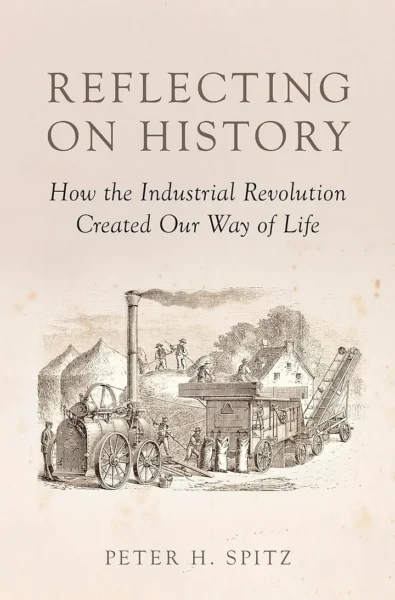
Peter H. Spitz’s new book is Reflecting on History: How the Industrial Revolution Created Our Way of Life. The book is refreshingly straightforward, candid, and clinical. Normally its unemotionality would be something of a detriment to the text, particularly those not familiar with or naturally drawn to its fact-based content. But Spitz has a particular way of communicating, painting pictures in one’s mind despite the necessarily removed nature, that still enthralls with the beats of a seasoned storyteller. It’s clear he’s immersed himself in the topic, to the extent the communication and delivery flows naturally and without any distinctive hitches.
ABOUT THE AUTHOR: www.linkedin.com/in/peter-h-spitz-60b41315
As far as Spitz is concerned, history is part and parcel to the state of affairs with the relatively speaking ‘present.’ This is obviously reflected in the choice words used in the titling of the read, simply put ‘Reflecting on History’ fully encapsulates Spitz’s reverence foe what came before, and genuine intrigue in how – like a puzzle piece – it fits so perfectly into the evolution of what exists today. What I found so brilliant about this thought process is how it so effectively showcases the symbiotic relationship between past and present, and to a certain extent future to boot. You’re left genuinely intrigued by the content of Reflecting on History: How the Industrial Revolution Created Our Way of Life because, a la Faulkner, the past never really is dead. It lives and breathes through every thought, every innovation, every breakthrough one makes in the so-called present day.
“Many people have taken History (now called Social Studies) courses in High School. Depending on our specific curriculum, we might have learned about the Industrial Revolution or not, considering that our Social Studies courses don’t always include European history. So, it
would not be a surprise if many people picking up this book have no idea of what Europe was like some 350 years ago when the Industrial Revolution commenced in Great Britain and, to some extent, in other countries,” Spitz proclaims. No idea, but needing to.
After all, the industrial revolution is the spark that has led to, arguably, virtually every technological innovation since. History is never far, as Spitz shows time and again, rather it is embalmed in the cruxes of what makes up industry today. Spitz reflects this brilliantly in the different, chaptered focuses on various forms of industry. In short: Papermaking, Photography, Natural Gas, Communications, Refrigeration, Electricity, Robots, Flight, Plate Glass, 3M Post-it, Railroads, Petroleum, Radio, Steelmaking, Penicillin, Computes, Textiles, Tires and Synthetic Rubber, Automobiles, Petrochemicals, Television, Microwave Ovens, Nitrogen: Crops and Explosives, Lighting, and Thermoset Plastics.
AMAZON: www.amazon.com/Reflecting-History-Industrial-Revolution-Created-ebook/dp/B0D38RM5JX
“Much of my writing (including three published books) has largely covered the chemical and energy industries, though I also wrote an autobiography that covers a lot of the history I have personally lived through over this interesting period,” Spitz states, in the book’s introduction. “…Many books and articles have been written about the Industrial Revolution and that has greatly helped my research. However, I have found no books that look at the subject from the same perspective as I have in this book.”
Clay Burton
